Related Research Articles
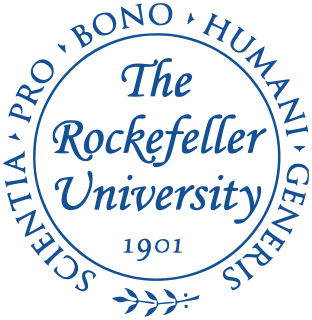
The Rockefeller University is a private graduate-only university in New York City. It focuses primarily on the biological and medical sciences and provides doctoral and postdoctoral education. It is classified among "R2: Doctoral Universities – High research activity". Rockefeller is the oldest biomedical research institute in the United States. The 82-person faculty has 37 members of the National Academy of Sciences, 17 members of the National Academy of Medicine, seven Lasker Award recipients, and five Nobel laureates. As of March 2022, a total of 26 Nobel laureates have been affiliated with Rockefeller University.
The Regius Professorships of Divinity are amongst the oldest professorships at the University of Oxford and the University of Cambridge. A third chair existed for a period at Trinity College, Dublin.
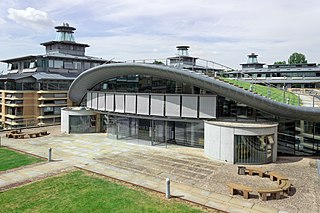
The Faculty of Mathematics at the University of Cambridge comprises the Department of Pure Mathematics and Mathematical Statistics (DPMMS) and the Department of Applied Mathematics and Theoretical Physics (DAMTP). It is housed in the Centre for Mathematical Sciences site in West Cambridge, alongside the Isaac Newton Institute. Many distinguished mathematicians have been members of the faculty.

David Keilin FRS was a Jewish scientist focusing mainly on entomology.
The White's Chair of Moral Philosophy was endowed in 1621 by Thomas White, Canon of Christ Church as the oldest professorial post in philosophy at the University of Oxford.

George Henry Falkiner Nuttall FRS was an American-British bacteriologist who contributed much to the knowledge of parasites and of insect carriers of diseases. He made significant innovative discoveries in immunology, about life under aseptic conditions, in blood chemistry, and about diseases transmitted by arthropods, especially ticks. He carried out investigations into the distribution of Anopheline mosquitoes in England in relation to the previous prevalence of malaria there. With William Welch he identified the organism responsible for causing gas gangrene.
James Douglas Jamieson was a cell biologist and professor at the Yale School of Medicine. His early research in cell biology of pancreatic acinar cells in the lab of George Palade established the function of the Golgi apparatus in secretory protein trafficking.

Sir Arthur Everett Shipley GBE FRS was an English zoologist and Vice-Chancellor of the University of Cambridge.

The CambridgeFaculty of Divinity is the divinity school of the University of Cambridge. It houses the Faculty Library.

Ann Bishop was a British biologist from Girton College at the University of Cambridge and a Fellow of the Royal Society, one of the few female Fellows of the Royal Society. She was born in Manchester but stayed at Cambridge for the vast majority of her professional life. Her specialties were protozoology and parasitology; early work with ciliate parasites, including the one responsible for blackhead disease in the domesticated turkey, lay the groundwork for her later research. While working towards her doctorate, Bishop studied parasitic amoebae and examined potential chemotherapies for the treatment of amoebic diseases including amoebic dysentery.
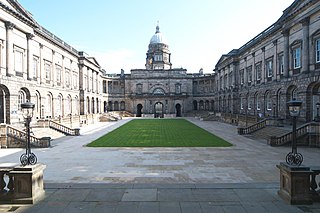
The Regius Chair of Engineering is a royal professorship in engineering, established since 1868 in the University of Edinburgh, Scotland. The chair is attached to the University's College of Science and Engineering, based in the King's Buildings in Edinburgh. Appointment to the Regius Chair is by Royal Warrant from the British monarch, on the recommendation of Scotland's First Minister.

The Molteno Institute for Research in Parasitology was a biological research institute in the University of Cambridge, UK, situated on the Downing Site and founded in response to an appeal by the Quick Professor by a $150 000 gift from Mr & Mrs Percy Alport Molteno in 1919. When it opened in 1921 it was the first parasite biology institute to be established. Between 1947 and 1964 the MRC Chemotherapy Research Unit was based in 'the Molteno', but research into parasitology continued alongside. Later, between 1968 and 1987, 'the Molteno' became fully occupied by the MRC as their Biochemical Parasitology Unit and totally dedicated to research into parasitology, although the building was still rented from the University of Cambridge. In September 1987 it became part of the University of Cambridge's Pathology Department. Notable workers include Ann Bishop, Douglas Mackay Henderson, David Keilin, Thaddeus Mann and Brunó Ferenc Straub.
The Perkins Professorship of Astronomy and Mathematics is an endowed professorship established at Harvard College in 1842 by James Perkins, Jr., (1761–1822).

Doris Mackinnon was a British zoologist. Born in Scotland, her father was a Consular Agent and her mother managed a "women's home". Influenced by Maria Gordon, Mackinnon studied botany and geology at Aberdeen University, graduating in 1906. She received the "Carnegie scholarship", studying abroad for two years before returning to Scotland. She achieved her doctorate from Aberdeen University in 1914, becoming a lecturer at University College, Dundee in 1916.
Judy Hirst is a British scientist specialising in mitochondrial biology. She is Director of the MRC Mitochondrial Biology Unit at the University of Cambridge.

Wang Yinglai, also known as Ying-Lai Wang, was a Chinese biochemist recognized as the first person to create synthetic insulin, a major scientific breakthrough that produced a biologically active compound from inorganic chemicals. He was one of the first group of scientists elected to the Chinese Academy of Sciences in 1955. He founded the Shanghai Institute of Biochemistry in 1958 and served as its director until his retirement in 1984.
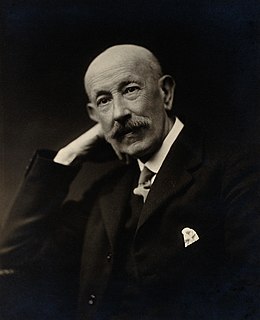
Sir Frederick William Andrewes was an English physician, pathologist, and bacteriologist.
Frederick James Quick was a wholesale dealer in tea and coffee in the City of London, chairman of the firm Quick, Reek, and Smith.
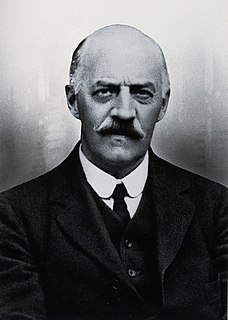
George Stuart Graham-Smith was a British pathologist and zoologist particularly noted for his work on flies, both as disease vectors, and as organisms of interest in their own right.
References
- ↑ "Quick, Frederick James (QK855FJ)". A Cambridge Alumni Database. University of Cambridge.
- ↑ Sir Humphry Davy Rolleston (1932). "Department of the Quick Chair of Biology". The Cambridge Medical School: A Biographical History. CUP Archive. pp. 117–119. GGKEY:ZZD78EUR4DK. Retrieved 21 October 2012.